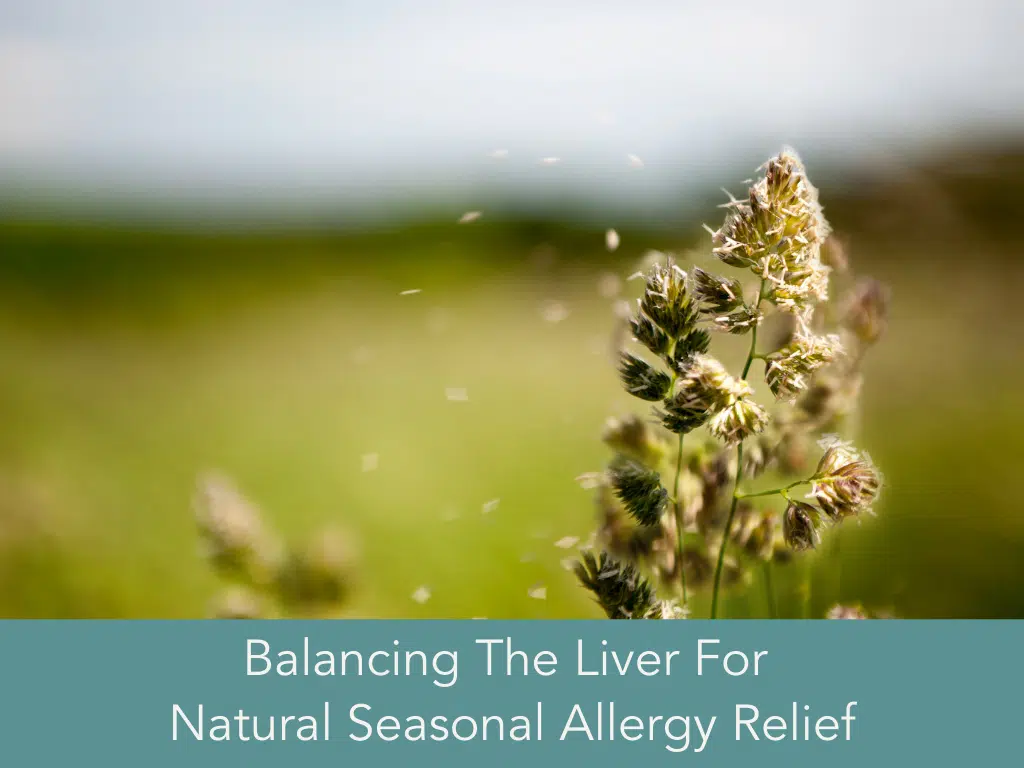
What You Will Learn in This Article
- Why optimal liver detoxification is essential to seasonal allergy relief
- Why care about drug-free allergy relief?
- 10 lifestyle strategies for natural allergy relief
- Support the liver
- Try the Elimination Diet
- Food and lifestyle choices
- Best foods for seasonal allergies
- Worst foods for seasonal allergies
- Top herbs and spices for natural allergy relief
- Neti pot and saline rinse
- Does local honey really help?
- Supplemental support
- Use an air filter
- Where to start
If you’re in your 40s, 50s, or 60s and think back to when you were in grade school, most likely, there were only one or two kids in your class who suffered from seasonal allergies. Today, there might be one or two kids who don’t. Allergies have become so prevalent that we assume that they’re normal. They aren’t.
Why have allergies become so common? Clearly, something has changed in the way we live.
In the last few decades, we’ve been subjected to an increase in toxins from every direction, putting an increased burden on our liver: in conventional agriculture with all its pesticides, herbicides, fungicides, and chemical fertilizers; in food production with an increase in preservatives, fillers, and genetically engineered ingredients; and in chemical-laden products we use on our bodies like skincare and in our homes like cleaning products and mattresses.
Read more: Top 4 Heavy Metals that Cause Hormone Imbalance, Fatigue, and Weight Gain
We’re triggering our immune systems on a daily basis with these toxins. It’s no wonder that the immune response is so easily activated by natural substances like pollen, dander, dust, and mold. It’s like having an almost full bucket of water and then trying to pour more in. It doesn’t take much for the bucket to overflow, resulting in uncomfortable symptoms like sneezing, itchy eyes, brain fog, and fatigue.
You don’t have to suffer. You can easily and naturally reduce your body’s response to allergens – this article shows you how to do it.
Why Optimal Liver Detoxification is Essential to Seasonal Allergy Relief
Whenever someone is dealing with seasonal allergies, it’s a sign that the immune system is on “hyper-alert” and there’s chronic inflammation going on.
Seasonal allergies are also a good indication that the liver is overburdened.
Your liver performs about 200 vital functions every day, which ultimately impact every system of the body. For example, it detoxifies the blood, excretes used up hormones, eliminates drugs, and produces bile, which is important for fat digestion and estrogen metabolism.
If the liver isn’t functioning optimally, these vital functions don’t work well, either. Detoxifying the liver is key to seasonal allergy relief. It’s also one leg on the 3-legged stool for achieving hormone balance. The other two are restoring the gut and balancing blood sugar. When everything is in balance, they lower inflammation in the body and impact how – or if – you respond to seasonal allergens.
The Three Legs to Achieving Hormonal Balance
What are the benefits of a better functioning liver?
- Great cholesterol stats
- Improved digestion
- Clear, healthy skin
- Balanced blood sugar
- Fewer allergies — to foods, pollen, chemicals, etc.
- Balanced hormones
The liver plays a huge role in our hormone balance. Learn more in this article on the liver.
Why Should We Care About Drug-Free Allergy Relief?
There are plenty of both OTC and prescription allergy medications. Antihistamines are some of the best-known go-to allergy remedies. It’s likely that your doctor has prescribed you these medications for seasonal allergies.
Why should we care about natural antihistamines and drug-free allergy relief? It goes back to the liver. OTC drugs are processed in the liver, adding to its toxic burden. The liver is resilient, but it can certainly get overwhelmed. When there are so many toxins to process, it may lead to prioritizing the ones that are the most dangerous.
For example, as mentioned, the liver helps eliminate “used up” hormones, like estrogen. If it’s already overwhelmed with OTC and prescription drugs, estrogen may not get fully eliminated, and instead recirculates in the body — leading to estrogen dominance. Other toxins, like pesticides, heavy metals, and mold toxins may start to build up, leading to increased inflammation and allergies.
Read more: Top Herbs for Liver Health & Estrogen Detoxification
Using pharmaceutical antihistamines over time can also be hard on the gut. Side effects include diarrhea or constipation. (1) The combination of an overburdened liver, an erratic gut, and a triggered immune system over time leads to Estrogen Dominance, thyroid problems, chronic inflammation, and allergies — both food and environmental, including seasonal allergies.
This explains why many people stop responding to antihistamines and anti-allergy medications. Addressing the underlying causes of allergies might therefore be the best way to go.
Take The Quiz: How Estrogenic Are You?
10 Lifestyle Strategies For Natural Allergy Relief
If you’re ready to try something new to alleviate your seasonal allergies, take control of your hormones, and say goodbye to OTC medications, you might be happy to find that adjusting a few of your lifestyle choices can make a powerful impact. This includes what you eat, what herbs or supplements you take, and what natural therapies you use.
When I was in private practice, my clients would report that implementing the below changes not only helped their hormonal balance but also reduced or completely eliminated their seasonal allergies.
Try An Elimination Diet
Consider doing an Elimination Diet for a while – we recommend a minimum of 28 days. Doing so can help take the burden off your liver, lower inflammation, and allow the gut to heal. Allergies happen when there is an overflow of toxins and inflammatory responses, including histamine. By doing so, you will reduce the “full bucket” and prevent an “overflow” which is when allergies manifest.
The liver is a mighty detoxification organ that can reduce the “overflow” and overwhelm caused by toxins, making liver support a great way to start.
Removing foods that may have been causing inflammation, via an elimination diet, can work as a sort of “reset button.” When inflammation has gone down due to a lower toxic load and a break from the foods you may have been eating day after day, it’s in a great position to heal. Liver detoxification and an elimination diet go hand-in-hand to reduce inflammation and calm the immune response.
Both of my books, Overcoming Estrogen Dominance and Cooking for Hormone Balance, have complete meal plans for doing an elimination diet. Learn more about Elimination Diets in this article.
Support The Liver With Bitter Herbs
Another way to support the liver is by introducing bitter foods, herbs, and digestive bitters.
Our Wellena Digestive Bitters – After tincture includes burdock, andrographis, and other classical bitter herbs that are well documented to improve liver function. Dandelion is another bitter herb to include; both the leaves and the root support liver function. It’s on our list of the top herbs for liver health and estrogen detoxification.
Dandelion (both leaf and root) is also a bitter herb. Like other bitters, dandelion stimulates bile production, which is important for the liver’s detoxification process. Having adequate bile production and flow helps the liver bind estrogen and other steroid hormones so that they are removed from the body through the stool.
Bitter herbs also stimulate the production of digestive enzymes, which help break down food so that it’s easier to digest and absorb. If digestive enzymes are in short supply, the body isn’t able to get all the nutrients it needs from the food. Learn more about digestive bitters here.
You can also incorporate bitter herbs into your daily routine by eating more cruciferous vegetables (such as arugula, mustard greens, collard greens) as well as herbs, see the below recipes.
- Simple Dandelion Tea For Liver Detoxification and Hormonal Health
- Steamed Collard Greens to Balance Hormones Naturally
- Orange Fennel Salad
- Seed Rotation Pesto
Food Choices & Lifestyle Choices
As you’ve read so far, what you eat impacts your gut—including liver function and gut health—which has a “trickle-down” effect. When the gut is compromised and food particles enter the bloodstream, the immune system gets triggered. It then sends inflammatory cytokines as a response, commencing an autoimmune or allergic response.
While you can have an allergic response to any food, certain foods tend to be more inflammatory than others. On the other hand, other foods can calm the immune response.
If you deal with seasonal allergies, focus more on these foods (unless you have an individual intolerance):
Best Foods For Seasonal Allergies
A diet rich in these foods supplies nutrients that help lower the inflammation and allergic response.
- Vitamin C-rich foods: Vitamin C helps lower inflammation and histamine levels. (4) While citrus is high in vitamin C, it may aggravate allergies in some people, as it can trigger histamine release. Low histamine vitamin-C-rich foods include broccoli, cauliflower, cabbage, kohlrabi, Brussels sprouts, mango, blueberries, and blackberries.
- Quercetin-rich foods, including onions (especially red onions), apples, capers, scallions, broccoli, kale, Brussels sprouts, cherries, berries, and grapes. Quercetin is a great natural antihistamine. (5)
- Deeply-colored vegetables and fruits, like turmeric, blueberries, green tea, dark chocolate, pomegranate, and black rice. These foods are rich in polyphenols that help lower inflammation. (2)
- Carotenoid-rich diet: Eat plenty of dark leafy greens (including nettles) and yellow/orange vegetables. Carotenoids support respiratory health and are rich in antioxidants and anti-inflammatory compounds. A diet high in carotenoids was associated with decreased allergies in a German study. (3)
- Omega-3-rich foods, including fresh wild salmon, herring, Pacific mackerel, and trout. These help to lower inflammation and lessen symptoms of allergies and asthma. (6)
Worst Foods For Seasonal Allergies
The foods that are worst for seasonal allergies are those that raise inflammation levels and trigger mast cells to release histamine.
These are the foods to avoid which contribute to the “bucket overflow”:
- Alcohol: We know alcohol is bad for the liver and can be highly inflammatory. Overdoing it long-term can lead to fatty liver disease, cirrhosis, and liver cancer. Find out more about how alcohol impacts your hormones and our experience with doing a “Dry January” (but you can try it any time of year.)
- Sugar: Sugar is known to cause inflammation throughout the body.
- Deep-fried foods: Not only are the oils used for deep frying inflammatory, but the frying process creates compounds that are toxic to the body.
- Processed foods: Preservatives, additives, colorants, GMOs, and bad oils all contribute to inflammation in the body.
- Dairy products (including milk from cow, goat, and sheep)
- Grains, especially gluten-rich ones, like wheat, spelt, barley, and rye.
- Gluten: A well known inflammatory contributor
- Corn: Technically a grain
- Eggs: A common allergen
- Potatoes and (potentially) other starchy root vegetables
- Fermented foods and aged foods: These foods are high in histamine, which is known to aggravate allergies.
For some people, it may not be necessary to avoid all these foods all the time. It may be enough to eat an overall anti-inflammatory diet and then adjust the diet during the worst times of seasonal allergies.
Take Nightly Showers
Another daily lifestyle strategy during high allergy times is to take showers at night to remove any pollen that’s accumulated in your hair during the day. That way, you’re keeping this pollen out of your bedroom and off your pillow at night. This is a strategy The American College of Allergy, Asthma, & Immunology recommends for seasonal allergies. (7)
Top Herbs and Spices For Natural Allergy Relief
As you eat an allergy-friendly diet, here are some herbs and spices that can also help lower inflammation and histamines:
- Turmeric – This spice is a well-known anti-inflammatory compound that has also been shown to lower allergenic reactions.
- Nettles – While this plant can cause inflammation to the skin if you come upon it on a hike, the supplement is a great natural anti-inflammatory, antihistamine, and source of important minerals. It’s rich in histamine-lowering quercetin.
You can also give yourself some airway-friendly self-care by adding the Herbal Facial Steam with Nettle:
- ½ loosely packed cup fresh nettle leaves, or 1 cup dried nettle leaves
- ⅛ loosely packed cup fresh oregano or ¼ cup dried oregano
- 2 quarts of hot filtered water
- Heat water on the stove or in a kettle.
- Prepare herbal steam by placing fresh or dried nettles and oregano into large heat-safe bowl.
- Once water is hot but not boiling, carefully cover the leaves.
- Immediately place face over the bowl and cover your head with a towel. Inhale the steam, relax and enjoy for at least 5 minutes and up to 15 minutes. If it’s too hot, lift the towel to release some steam, then cover again. Repeat as necessary.
- Quercetin-rich herbs – Quercetin is a flavonoid that is naturally found in foods and herbs like nettles, dill, cilantro, juniper, Mexican oregano, chives, and tarragon. As a supplement, it’s used as a natural antihistamine and anti-inflammatory.
Here are some of our favorite recipes using these herbs and compounds:
- Apple Cider Turmeric Ginger Gummies
- Nettle Infusion
- Lymphatic Tea
- Jamu Shot and Spritzer – A Woman’s Tonic
Beyond food and seasonings, there are also some lifestyle hacks and supplements that may help.
Neti Pot and Saline Rinse
A neti pot can be really helpful for clearing nasal passageways and lowering inflammation. A saline rinse can help for the same reason. The salt helps to thin the mucus in the nasal cavity, remove allergens, and potentially lower histamine. A review published in the Cochrane Library found that saline nasal irrigation was helpful for those suffering from allergic rhinitis. (8)
Pollen levels are typically higher in the morning so this is a great practice after your morning walk. Or, combine it with your nightly shower.
Does Local Honey Really Help?
Local honey is said to help allergies because it’s made from the pollen in the area. The idea of using honey comes from the concept of immunotherapy, where a small amount of an irritant is introduced to the body. This helps your immune system recognize it and, hopefully, prevent a negative response.
A Malaysian study published in 2013 found that honey in higher doses (50 or 80 grams at a time) helped improve symptoms of allergies. While clinical research studies are few, many people who have tried it report that it helps ease their allergies. While we wouldn’t recommend eating that amount of honey in one dose, it might be worth trying local raw honey in your morning or evening tea. (9)
Here’s our Herbal Honey recipe, which is great not only for allergies but also for balancing hormones and boosting the immune response.
Supplemental Support
Here are some top supplements to consider including for natural allergy relief:
Quercetin Plus Nettles – Our Wellena Quercetin Plus Nettles supplement is a great natural antihistamine and can help get allergies under control. You can read more about the benefits of these two natural ingredients here.
Many of our customers experience seasonal allergy relief by incorporating this supplement into their daily routine in addition to modifying their diet.
Our recommended supplement: Quercetin Plus Nettles
Probiotics – All probiotics are not created equal. Certain strains have been proven beneficial for different purposes. Some are helpful for healing the gut and others are helpful specifically for allergies. Either way, it’s important to both heal the gut and lower general inflammation in the body to lower allergies.
Our recommended supplement: Sacch-Myces.
Vitamin C – Go for a whole food version whenever possible: Acerola, Camu Camu, and amla are all great. You want to take vitamin C in divided doses, adding up to approximately 2,000 mg/day.
Our recommended supplement: Vitamin C Burst.
Omega 3 – Omega-3 supplements are important for all kinds of functions in the body. One of the most important for allergies is the ability of omega-3 fatty acids to lower inflammation. Learn more about fish oil for inflammation in this article.
Our recommended supplement: Wellena Essential Omegas.
This supplement is a high-potency, 3rd party tested fish oil that is molecularly distilled to ensure purity.
Use an Air Filter
Indoor air pollution may also be aggravating your allergies, as it can be full of things like pollen from outside, pet dander, and mold spores. A good quality air filter like AirDoctor can help.
It has three types of filters for thorough cleaning of allergy triggers:
- The Ultra HEPA filter removes pet dander, mold, pollen, dust mite debris, smoke, bacteria, and viruses.
- The Activated Carbon filter removes ozone, formaldehyde, VOCs, and other dangerous gasses.
- The high CADR removes smoke, dust, and pollen.
If all that is too much to take in right now, the following are some ideas on where to start.
Where to Start
If you struggle with seasonal allergies, we recommend focusing on liver detoxification. Remember: your liver is essential for allergy symptom relief and for bringing your hormones into balance.
1. Take a load off your liver by following a low histamine, anti-inflammatory diet.
2. Incorporate the humble stinging nettle (Urtica dioica). Nettle can be used as a tea, infusion, supplement, or even an herbal facial steam, as outlined above.
Here are some great ways to incorporate nettle for natural allergy relief:
- Add the Quercetin Plus Nettles supplement to your seasonal allergy arsenal. Many women in our community use Quercetin Plus Nettles to improve their liver function and decrease inflammation in their bodies, ultimately reducing typical seasonal allergy symptoms like sneezing, runny nose, itchy eyes, sore throat, and brain fog.
- Brew up your own batch of nettle infusion. This infused herbal tea is high in vitamin c, anti-inflammatory, and may inhibit the body’s normal histamine production.
- Surprisingly, fresh nettles are great as a side dish. The bushes are fairly easy to find growing wild in the spring and summer, depending on where you live, as it’s distributed throughout the United States and Canada and it’s native to Europe. Be careful harvesting them (wear gloves) and make sure the nettles are growing in a place that’s not likely to have been sprayed with herbicides or in close proximity to a well-traveled road. Many farmer’s markets sell them, too.
- Nettles can be used in the same ways as spinach and other leafy greens; sauteed in olive oil, added to a soup, used in pesto, and even substituted in your favorite spinach quiche recipe. Here’s an easy recipe for Sauteed Stinging Nettles.
3. Try adding our Wellena Digestive Bitters – After following meals.
4. Consider a 28-day Elimination Diet to give your liver, gut, and immune system a reset.
What have you done to reduce or eliminate your seasonal allergies? Share your experience in the comments below.
Resources
- Farzam, K., Sabir, S., & O’Rourke, M. C. Antihistamines. StatPearls [Internet]. Updated December 13, 2021.
- Yahfoufi, Nour et al. “The Immunomodulatory and Anti-Inflammatory Role of Polyphenols.” Nutrients. November 2, 2018.
- Kompauer, Iris et al. “Association of carotenoids, tocopherols and vitamin C in plasma with allergic rhinitis and allergic sensitisation in adults.” Public health nutrition. 2006.
- Jarisch, R et al. “Impact of oral vitamin C on histamine levels and seasickness.” Journal of vestibular research : equilibrium & orientation. 2014.
- Mlcek, Jiri et al. “Quercetin and Its Anti-Allergic Immune Response.” Molecules (Basel, Switzerland) vol. 21,5 623. May 12, 2016
- American College of Allergy, Asthma & Immunology. Seasonal Allergies. American College of Allergy, Asthma & Immunology website. December 28, 2017.
- Miyata, Jun, and Makoto Arita. “Role of omega-3 fatty acids and their metabolites in asthma and allergic diseases.” Allergology international : official journal of the Japanese Society of Allergology. 2015.
- Head, Karen et al. “Saline irrigation for allergic rhinitis.” The Cochrane database of systematic reviews. June 22, 2018.
- Asha’ari, Zamzil Amin et al. “Ingestion of honey improves the symptoms of allergic rhinitis: evidence from a randomized placebo-controlled trial in the East coast of Peninsular Malaysia.” Annals of Saudi medicine. 2013.
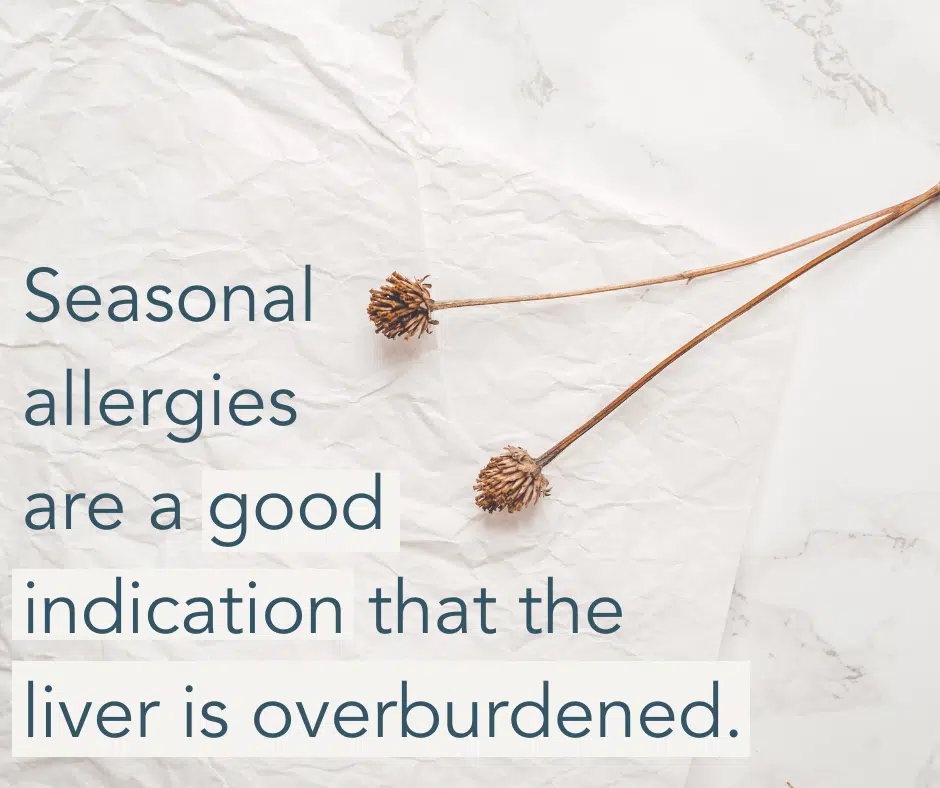
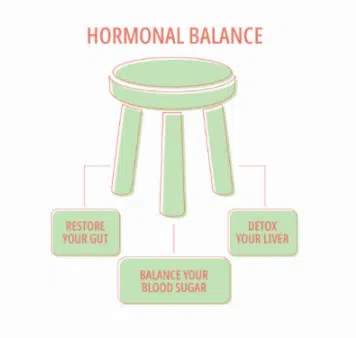
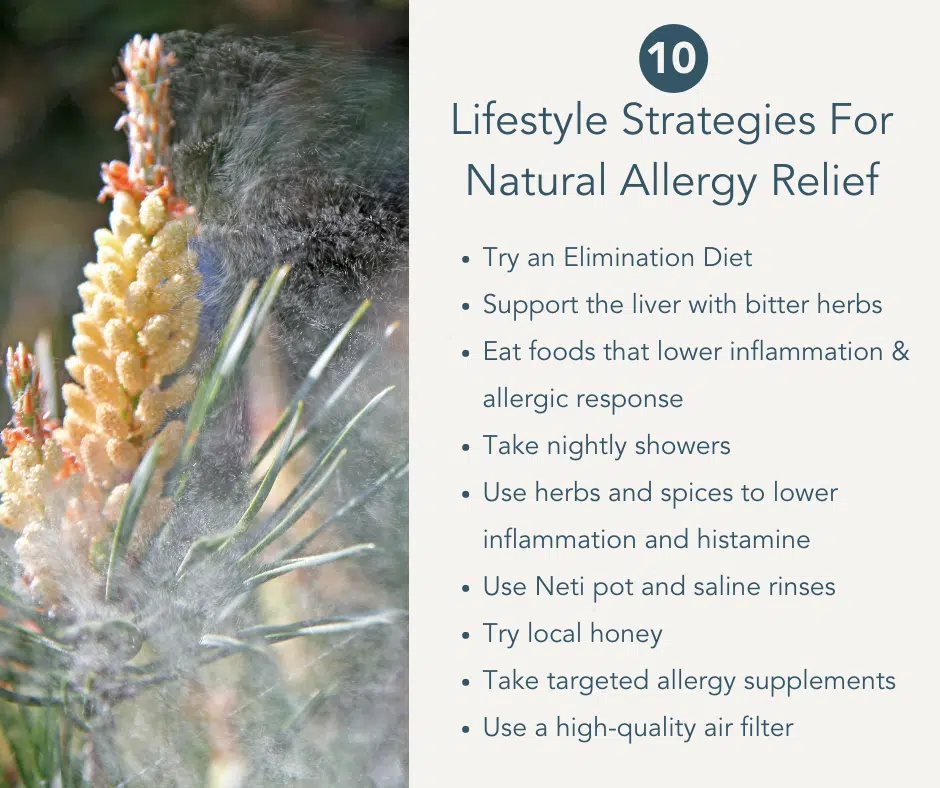
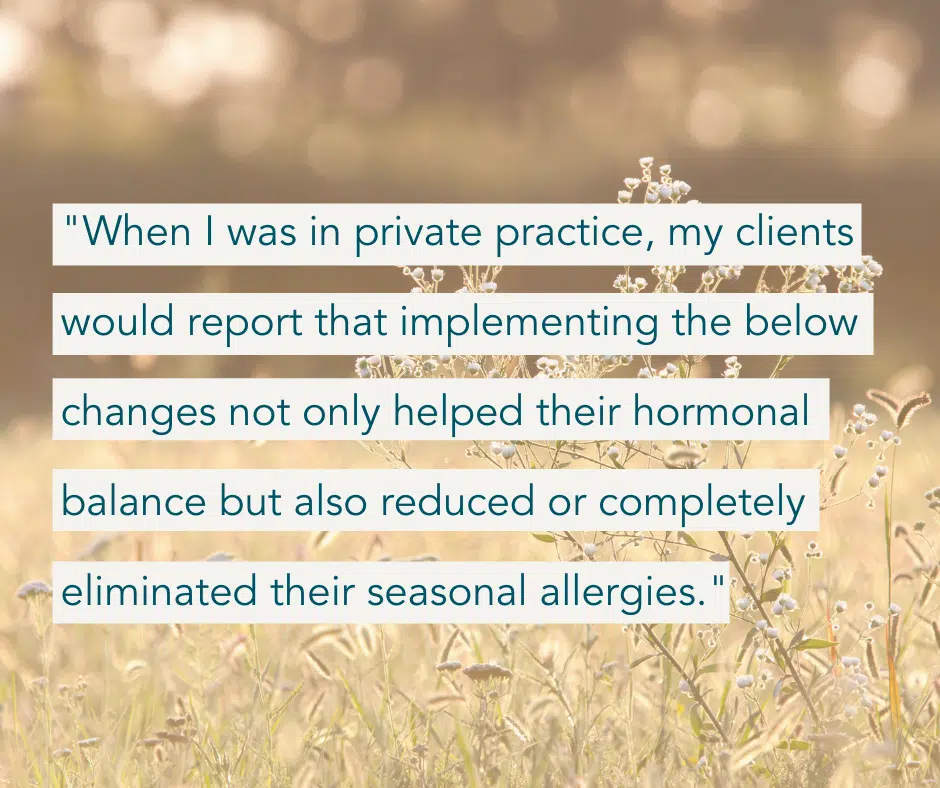
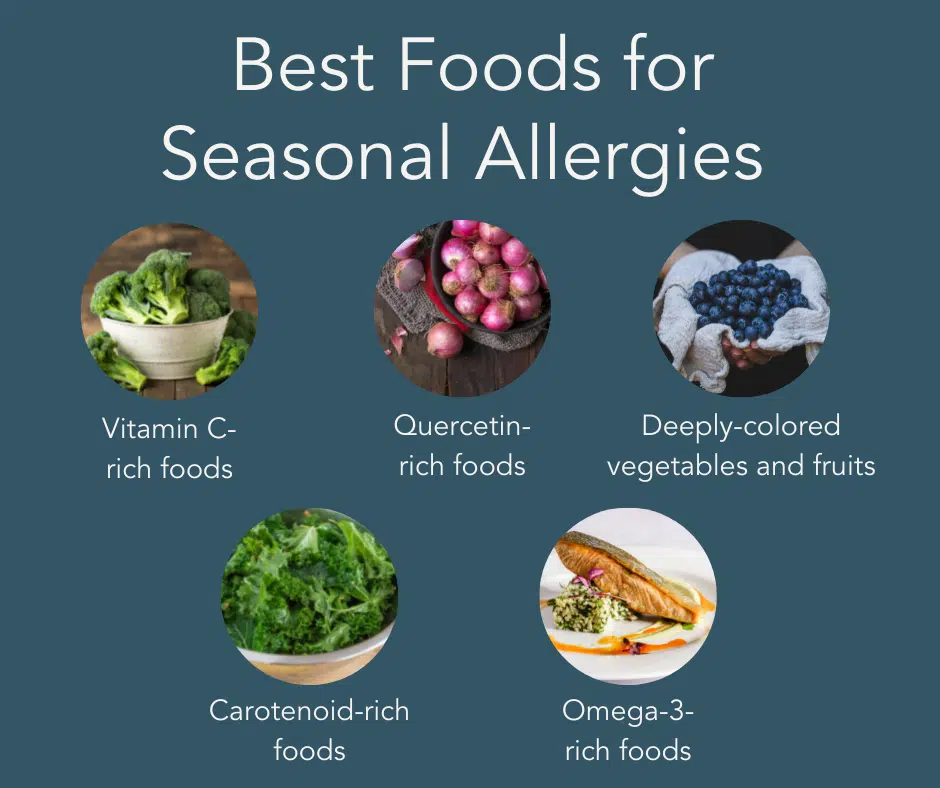
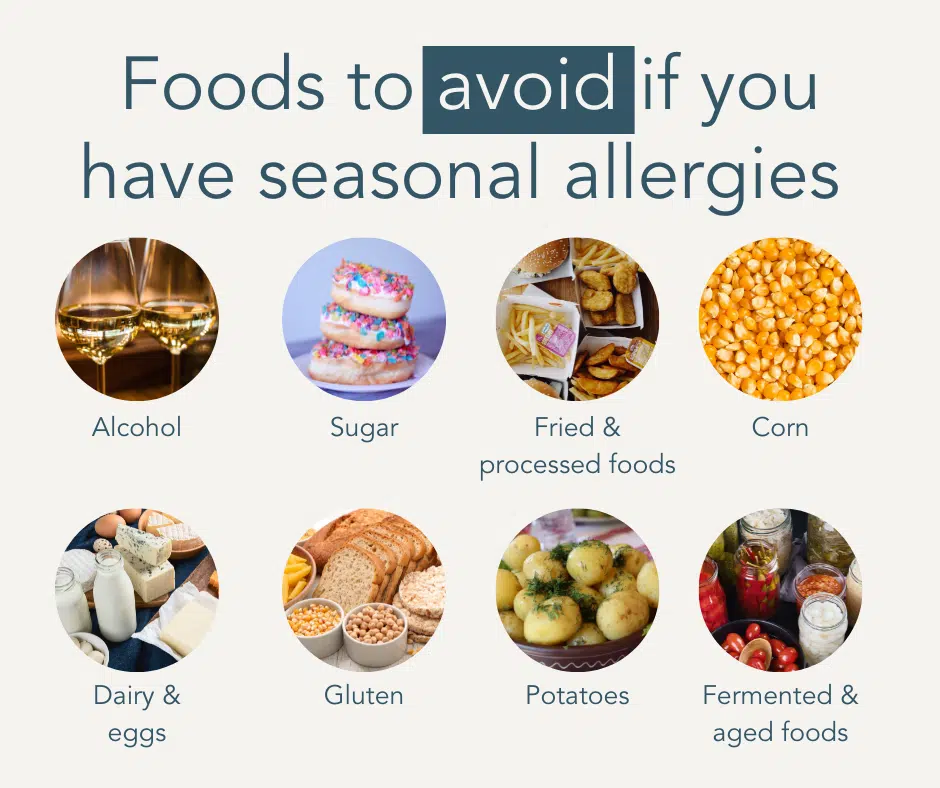
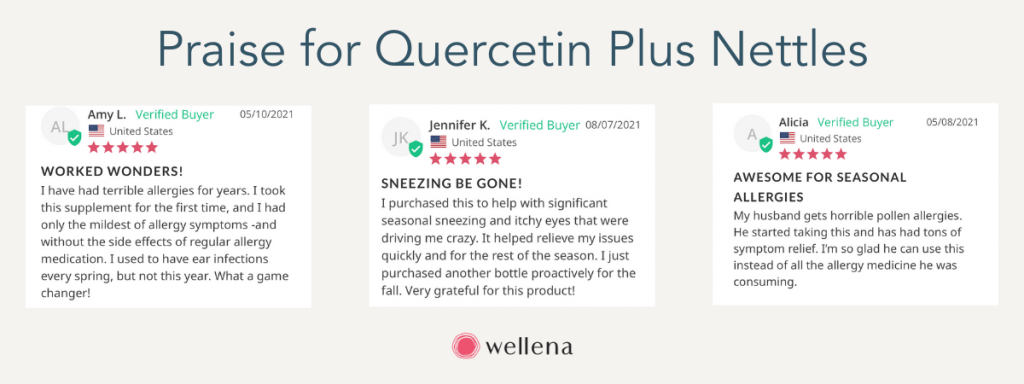
Great article, my husband struggles with allergies, going to use some of these suggestions!
I have found green tea works well for me. I like the organic bulk decaf green tea from Arbor Teas. I appreciate learning more about the benefits of nettle; I’m looking forward to trying to find some local nettle growing wild this summer to sauté with garlic. Have never seen it at our farmers market. Thanks for sharing all these ideas.
I am very confused. Always believed that nettles are good for allergies and are antihistaminic, now since I appear to have problems with histamiine was told by my naturopath not to consume nettles since they have lots of histamine. Can that be true?
Hi Rebecca, we’re glad that you enjoyed the article! Let us know what he tries out and how this impacts his allergies. ~HB Support
Hi Laurel, that sounds like a great way to source nettles. Fresh and local always provide the highest nutritional value. ~HB Support
Nettles aren’t full of histamine, they are natural anti-histamines.
I wish I didn’t react to nettle tea and dandelion. You might be fine most people are. X
cool!
Showers at night and a good air filter definitely help.